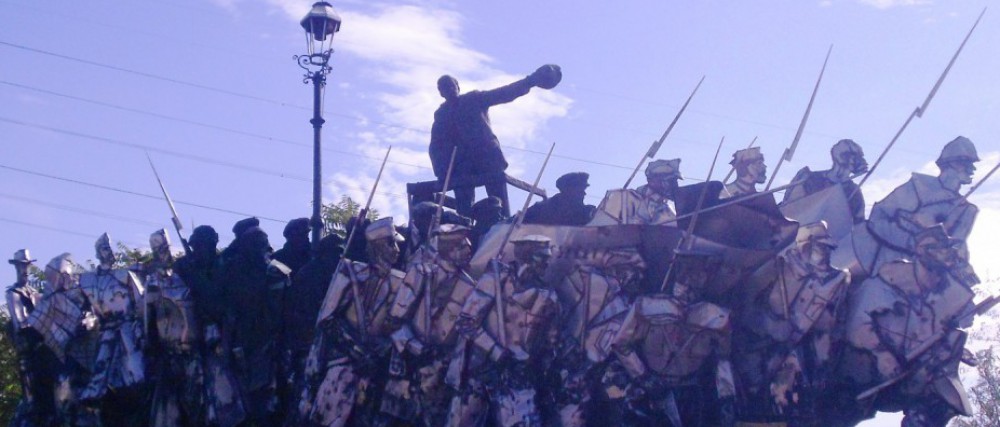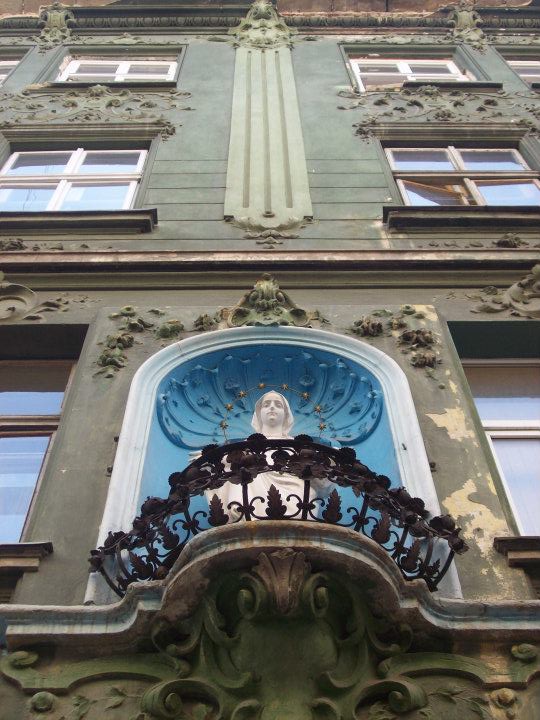The Golden Horseshoe Tour was all but over except for the drive back to Lviv. I was looking forward to a smooth and relaxing ride back to the city. What was I thinking? My expectations of Ukrainian highways had improved after we took the E40 from Lviv to Olesko, a recently resurfaced road in excellent condition. The same could not be said for the highway we returned on, the H02, the main route between Lviv and Ternopil. Our bus driver did his best to navigate the small craters pockmarking the highway. The shock absorbers on the bus were of little use as the vehicle bounced and slammed around the entire way back. There were a few brief and baffling respites, where the pavement was suddenly smooth for a kilometer. I noticed that such areas looked to have been totally repaved. It was as though the embezzlers of transport funds had decided to steal only 90% of the road improvement money. Maybe they had a bit of shame, then again it was probably the best way not to get caught stealing. The few smooth stretches of blacktop were evidence of a barely concealed cover up. Of course I was making assumptions, but no honest politician could inflict such a road on their constituents. And this was in Lviv Oblast, which was one of the best run provinces in Ukraine. I shuddered to think what the roads must be like in the rural eastern areas of Ukraine.
Beyond The Most Dangerous Place In The World – Back To Normal
Several times I noticed that quaint symbol of rural backwardness, the horse drawn wagon cart, plying side roads. There was one memorable and terrifying scene that involved a cart crossing the main highway we were traveling along. Traffic was moving along at well over 100 kph, despite the severe road induced jolts. On the edge of a small village, a wagon cart was stopped while waiting to cross a road that bisected the highway. As soon as there was a small opening in traffic, the wagon driver lashed his whip furiously, urging the horses forward. They frantically went into action, making a furious dash across the road, while the driver continued cracking his whip. The wagon made it across in time, but if anything had gone wrong, the resulting accident would have been deadly. It was an unforgettable scene of crazed courage. Fortunately our bus driver navigated all the unexpected road hazards with skill. I marveled at his ability to stay calm despite the nerve wracking obstacles he was forced to deal with.
A feeling of sadness swept over me at the tail end of the Golden Horseshoe Tour. Everything I had looked forward to with this tour had come to an end. I would likely never pass this way again. This was a part of the world relatively difficult for me to access, due to time and travel constraints. What I had seen and learned on this tour today was already becoming part of the past. Soon this experience would be little more than a memory. What would I remember? What would I take away? While the castles were fascinating, my most memorable experience was going on a tour where I was unable to verbally communicate with anyone. This had allowed me to take notice of the countryside, villages and highways, the state of this land at a unique moment in time. My awareness of the surrounding area was heightened. For many years I had been fascinated by western Ukraine, an area that I had studied as part of the Austro-Hungarian province of Galicia. It had been known for misery and starvation, but it was now almost a century since the empire’s collapse and the catastrophe of two World Wars. An argument could be made that during the first half of the 20th century, this land had been the most dangerous place in the world. Today, the countryside looked surprisingly normal. The past was just that, past. Life and death moved on.
The Land Of Getting By – On The Downside
I knew there was poverty all around here, but it was rural poverty which is deceptively benign. Even the poorest usually live in houses. They still have their gardens out back and chickens running wild in the yard. Poverty out here can lead to alcoholism, but also to self-sufficiency. This was the land of getting by, of headscarves and kerchiefs, horse drawn wagon carts and stray dogs. Rural western Ukraine looked much the same as rural Romania and more prosperous than the countryside of Bulgaria. It may not have been rich, it may not have been part of the European Union, but it was Eastern European for sure. Time moved forward here, but at a very slow and deliberate pace. The endemic corruption in Ukraine that I had read so much about, it was only noticeable here by the quality of the roads. People went about their business like anywhere else in Europe.
As for my fellow tour participants, the young man beside me had warmed up significantly, at one point offering up his window seat so I could get a better vantage point on the countryside. By the end of the ride back I was getting a few nods and half smiles out of him. We had the shared experience of being pariahs or at least feeling that way. The tour guide performed a minor miracle by not talking much on the way back even though she did not look a bit fatigued. Every hair was in place, the deep black eyes still burning holes in whatever was in her line of sight. Her facial expression belied an incredible intensity. Despite being unable to understand a word she said, I knew she took her work seriously. She looked ready and willing to do the tour all over again that very day if the situation had demanded it. The same could not be said for the passengers, a melancholic silence had descended upon the bus. This was different from the reverential silence everyone had displayed at the beginning of the tour. The journey was nearing its end. Now it was back to Lviv, back to home or work and in my case back to a few more days of vacation. Everyone was on the downside, with their thoughts fixed on the future. Our day together was now as much a part of history as what we had seen and learned about on the tour.
Looking Forward, Looking Backward – The Difference Between Us
As soon as we got into Lviv, a restless stirring began in anticipation of the final stop. People collected their belongings, kids squirmed in their seats and the bus inched its way through the late afternoon traffic. Lviv looked vaguely familiar, but felt very different. The bus halted at the curb just outside the old City Arsenal, the doors flew open. As I made my way to the exit, I turned around one last time to look at everyone and thought to myself, I will never see these people again. Then suddenly I was standing on the corner of a busy street. Lviv was the same city as before, but my perspective had changed. The Golden Horseshoe Tour, with its castles and sleepy countryside had little in common with Lviv. I had never noticed just how much energy was in the city, until I had experienced the surrounding rural hinterland. The contrast between the two was stark. The city at rush hour was moving with energy and dynamism, people were everywhere. The countryside had been stagnant and backward looking. Both places were in the same nation, the same region, the same oblast. They were only an hour and a world apart.






